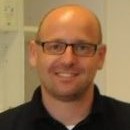I am an associate professor at the Technion’s Ruth and Bruce Rappaport Faculty of Medicine and the director of the Brain Systems Organization in Health and Disease Lab (or Kahn Lab in short). I have been interested in understanding normal human behavior and brain function and how brain disorders affect these functions from the beginning of my graduate training. Since I started the lab in 2010 we have been focusing on failures in organization of the brain that results in disrupted communication across brain systems. This work has applications to better understanding and treating brain disorders including neurodegenerative conditions such as Alzheimer’s and Parkinson’s diseases, as well as neurodevelopmental disorders such as neurofibromatosis type 1, autism and attention deficit hyperactivity disorder (ADHD). In parallel, we developed several platforms to study the behaving mouse while undergoing fMRI.
As an educator in the medical sciences I cherish the chance to interact with students, both trainees in research and medical students. A medical doctor treating her or his patients is among the few professionals who ought to have a deep understanding of humanity — the species and the quality. Others ought to at least have an understanding of the quality, and scientists are charged with having an understanding of nature as well. In addition to my interest in brain function, I have been involved in teaching medical students and increasingly I am becoming more involved in shaping medical education broadly. There are significant challenges associated with modern healthcare, from the increase in aging-related health issues, preventative care, rapid availability of novel but untested therapies, to the increasing costs of modern medicine and the societal burden and ethical challenges it poses. Moreover, the modern physician is required to master not only deep understanding of the biology of the human body, but also the technologies that allow us to monitor and treat our patients. At the same time, society is changing and the types of approaches used to teach in the past are incongruent with modern students and contemporary technology. We are now taking steps to address these challenges, so we can provide a relevant curriculum to our students and better prepared physicians to society.
I received a bachelor of science degree from Ben-Gurion University of the Negev in mathematics and computers science. After graduating in 1997, I became a research assistant in the department of neurobiology at the Weizmann Institute of Science. In 1999–2000 I worked as a software engineer at the Wohl Institute for Advanced Imaging at Sourasky Medical Center in Tel Aviv, where I helped set up the infrastructure for the research MRI unit.
In 2000 I entered the graduate program of Massachusetts Institute of Technology (MIT) and in 2005 received the degree doctor of philosophy (PhD) in neuroscience. I was a visiting scholar at Stanford University in 2004–2005 while completing my PhD. I then went on to become a post-doctoral associate at the Howard Hughes Medical Institute at Harvard University from 2006–2010.
Faculty:Medicine


